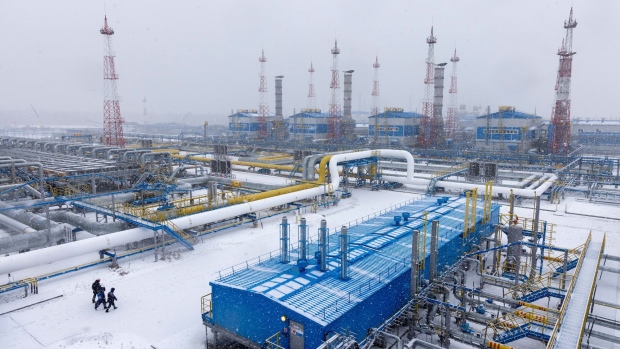Aug 23, 2022
How European Agencies Bankrolled Pre-War Russian Gas Expansion
, Bloomberg News

(Bloomberg) -- Through their little-known trade finance agencies, Germany, Italy and France have been among the biggest backers of Russian oil, gas and petrochemical development in the last several years, helping to enrich and insulate the country as it prepared to invade Ukraine.
Since Russia’s annexation of Crimea in 2014 through late 2021, German, Italian and French export-credit agencies guaranteed almost $13 billion in financing for projects in Russia, according to exclusive data compiled by the Global Strategic Communications Council, a nonprofit, worldwide network of climate experts. German and Italian state-owned banks lent a further $425 million.
Many of the projects that received funding have ties to sanctioned individuals, including Leonid Mikhelson, Russia’s second-richest person, and Gennady Timchenko, a close associate of Vladimir Putin. Germany and Italy arranged $4 billion in guarantees tied to Russia’s largest natural-gas processing plant, run by Gazprom PJSC, which was sanctioned in February. Its chief executive officer, Alexey Miller, has been under sanctions since 2018.
The five institutions — Euler Hermes, SACE, Bpifrance Assurance Export, KfW-IPEX Bank and Cassa Depositi e Prestititi — told Bloomberg they stopped new cover for or loans to Russian projects after the invasion of Ukraine, and said they were in compliance with applicable sanctions.
Many export-credit agencies operate without much public scrutiny. They typically provide credit guarantees, loans and insurance to domestic companies doing business in riskier parts of the world. French, Italian and German firms probably would have stayed out of Russia over the past decade without that backing, said Marcos Alvarez, head of insurance for global financial institutions at DBRS Morningstar, a credit-ratings agency. “They’re agents of last resort.”
The US barred its export-credit agency from transactions in Russia after it annexed Crimea. And while Europe’s agencies have put a pause on new business in Russia, Oleg Ustenko, Ukraine’s chief economic adviser, is pressuring them to make it permanent. He includes them in a long list of finance industry actors who, he says, have helped fund Russia’s war.
“These public finance institutions have made their governments complicit in Putin’s war crimes, filling Russia’s war chest and helping the Kremlin secure new export routes for its blood oil and gas,” Ustenko said.
Material Risk
The agencies aren’t always required to disclose the specifics of the loans and guarantees they make, so it’s difficult to accurately estimate their current exposure to Russia-related claims, analysts say. The typical duration of their project finance is 10 years to 15 years, suggesting that billions of dollars’ worth of guarantees and loans may be outstanding today.
In June, Russia defaulted on its sovereign debt for the first time in a century. Corporate borrowers also missed payments, putting billions of Russian debt into technical default.
No claims have been made on the German export-credit agency since Russia began its invasion of Ukraine on Feb. 24, according to a spokeswoman for Germany’s Ministry for Economic Affairs and Climate Action who responded to questions directed to Euler Hermes. The other firms declined to comment on any claims related to their Russian liabilities.
There’s “material risk exposure” for ECAs providing guarantees on the default of Russian names, said Alvarez. But “with the full credit and support of the government of their countries, they will probably be rescued — and that means money from the taxpayer.”
SACE’s exposure is “closely and carefully monitored,” a spokesperson for the agency said. Like Euler Hermes, Bpifrance and CDP, it declined to share current figures. A spokeswoman for KfW said the bank’s $42 million loan to Russian shipping company Sovcomflot was repaid in May 2022 “in compliance with all valid sanctions.”
Supplying Asia
At least two of the projects with European financial backing have helped Russia to develop export routes to Asia, which in turn have become critical to Russia’s ability to blunt the effects of western sanctions.
In 2021, Euler Hermes on behalf of Germany and Italy’s SACE guaranteed a combined 25% of the $9 billion in debt financing for Amur Gas Chemical Complex, a petrochemical facility in eastern Russia. The site is strategically located to serve buyers in China and part-owned by Chinese firm Sinopec.
The same year, SACE agreed to guarantee over $560 million worth of loans from Italian banks CDP and Intesa Sanpaolo for Arctic LNG 2, a controversial gas drilling facility in the Russian Arctic ocean. Production is planned for 2023 and, once running, it would enable Russian exports of almost 20 million tons of liquid natural gas per year primarily to markets in Asia.
As of March, the bank loans were put on hold, but the agreements had not been cancelled, Reuters reported. SACE and CDP declined to comment to Bloomberg on the matter.
‘Massive Laggards’
Public finance institutions have been under pressure to cut funding for fossil-fuel development in Russia and elsewhere since before the war, part of the broader campaign to reduce emissions and reverse the effects of climate change. ECAs are among the most enthusiastic backers of polluting projects, providing 11 times more support for fossil fuels than renewable energy from 2018 to 2020, according to an October report by Oil Change International.
ECAs are “massive laggards” when it comes to climate policy, said Nina Pušić, ECA strategist at Oil Change International. “Part of the reason is that they’ve been able to hide behind closed doors.”
Germany, Italy and France were among 34 countries that agreed last year to end international public finance for coal, oil and gas projects by 2023.
“The only way for ECAs to be consistent with the climate and human-rights commitments made by their country is to stop supporting any new oil, gas and coal projects with public money,” said Lucie Pinson, executive director of Reclaim Finance in France. “Their whole mandate needs to be changed.”
©2022 Bloomberg L.P.






